The environment in Western societies presents unique challenges for parents striving to instill strong Islamic values. The media, school curriculum, and peer culture often conflict directly with fundamental faith principles. Therefore, the task of Raising Muslim Children in the West requires intentionality, patience, and strategy. The goal is not to isolate your child, but to equip them with a strong Muslim core that allows them to navigate diverse surroundings with confidence and integrity. This guide offers actionable advice to help your child thrive as a faithful and proud Muslim.
How to Raise Pious Muslim Children: A Guide to Islamic Parenting
Islamic parenting in non-Muslim countries is about prioritizing spiritual growth and character development (Akhlaq) over mere compliance. Here are five essential steps to ensure you are Raising Muslim Children in the West successfully:
1- Model the Faith with Excellence and Consistency
The single most effective tool for Raising Muslim Children in the West is modeling piety. Children learn far more from what you do than what you say.
-
Ensure your own Salah (prayer) is performed on time and with Khushu' (focus). Let them see you turn to Allah when happy and when distressed.
-
Let them see you read the Qur'an and understand its meaning. This naturally encourages Islamic education at home.
-
Practice the highest standards of Akhlaq (manners) in your dealings with your spouse, family, and the community. This includes being truthful, kind, and forgiving. This active modeling helps them understand that Islam is a practical way of life, not just a set of rituals.
2- Prioritize Knowledge and Spiritual Safety
An Islamic child psychology approach recognizes that children need a reason to follow rules. Knowledge dispels doubt and strengthens belief.
-
Make learning the Qur'an and the Sunnah enjoyable, asking: How can I make learning the Quran fun for kids? Use interactive games, fun stories of the Prophets, and positive reinforcement.
-
Instill the habit of reciting the dua for righteous children and using the Adhkar (remembrances) daily for protection.
-
Focus on teaching Islam to kids by starting with the foundational belief in Tawheed (Oneness of Allah) before moving to Halal and Haram rules.
Find out more: Islamic Etiquette
3- Build a Strong Muslim Identity and Community Connection
A child's resilience against Western culture vs Islamic values depends on their Muslim identity development. They must be raising confident Muslim kids.
-
Teach them how to teach my child to be proud of their Muslim name by explaining its beautiful meaning and Islamic significance.
-
Connect them with a thriving local Masjid or Muslim school options in UK/USA to counteract the lack of Islamic peers in their secular school. This addresses how important is finding a strong Muslim community for my child.
-
Help them understand the history and achievements of the Ummah to foster pride in their heritage, reducing the likelihood of a Muslim youth identity crisis.
Explore now: Learn Noorani Qaida Online
4- Create an Open Dialogue on Temptation and Peer Pressure
Communication is vital, especially as they enter adolescence. Parenting Muslim teenagers in West requires a non-judgmental approach.
-
Be the first person your child comes to with questions about dealing with Haram in the West, sex, and social issues.
-
Address navigating peer pressure Islam proactively, giving them phrases and strategies to use when declining invitations to inappropriate events.
-
Discuss the difference between cultural norms and true Islamic obligations: What is the difference between Haram and 'just culture'? This helps them own their choices.
Check it out: Islamic rules for adopting a child
5- Focus on the Core Islamic Values First
When starting Raising Muslim Children in the West, don't overwhelm them with minor issues. Focus on character.
-
Focus on truthfulness, kindness to neighbors, respecting elders, and cleanliness. These are the What simple Islamic values should I focus on teaching first?
-
Introduce Salah gradually. When is the right time to introduce Salah (Prayer)? Around age seven, start teaching the movements and words; make it a habit by ten.
-
Teach them empathy and social justice, that being a Muslim means serving humanity.

Know more: How Do You Perform Wudu
How can I build a strong Muslim identity in my children?
A strong Muslim core is built by reinforcing the idea that Islam is a beautiful gift. Encourage them to be the best Muslim student, neighbor, and friend. Use stories of the Prophets and righteous companions to show Islam's compatibility with excellence in all fields. This is key to Muslim identity development.
How do I talk about Islam to my child’s non-Muslim friends?
Teach your child simple, factual, and positive language. Encourage them to see themselves as ambassadors.
-
Teach them how to talk about Islam to my child’s non-Muslim friends by focusing on commonalities: "We believe in one God, like Christians and Jews. We pray to thank God."
-
Encourage them to share food during Ramadan or Eid. Experience is often the best explanation.
What is the best way to handle cultural conflicts at school?
When Raising Muslim Children in the West, cultural conflicts are inevitable. Focus on respect, not argument. If a school activity conflicts with Islamic values, teach your child to politely and firmly decline, providing an alternative excuse rather than a confrontation. For example, regarding a pork lunch, teach them to say, "I am vegetarian," if that is simpler than explaining the Haram ruling.
Read more: Teaching Children to Speak the Truth
How to teach my child to be proud of their Muslim name?
Explain the linguistic beauty and the meaning of their name. Highlight historical figures who carried that name. If the name is Arabic, teach them to pronounce it clearly and insist that others do the same. This builds raising confident Muslim kids.
How do I answer hard questions about Allah and creation?
Answer honestly, with simplicity and awe. How do I answer hard questions about Allah and creation? Explain that Allah is unique and beyond our human imagination. Emphasize His attributes of mercy, power, and wisdom. Use the beauty of nature as evidence of His existence and power.
Should I allow my Muslim child to attend prom or mixed parties?
Given the risks associated with dealing with Haram in the West (unsupervised mixing, alcohol, and inappropriate conduct), attending events like prom or unchaperoned mixed parties is generally discouraged, as it goes against fundamental Islamic parenting in non-Muslim countries principles. Focus on providing healthy, Muslim-friendly social alternatives that foster connection without compromising Islamic values.
Learn more: How To Become A Better Muslim
What are safe Muslim media options for Western children?
Look for resources that reinforce Islamic values and positive Muslim role models. Seek out books, animated series, and educational apps created by trusted Islamic scholars. This provides a balance to secular media and helps maintain a strong Muslim core.
What resources are essential for Raising Muslim Children in the West?
Essential resources include access to a reliable, local Masjid or a flexible online madrasa for Australian children (or those in other Western nations), English translations of the Qur'an with Tafsir (exegesis), and specialized books on Muslim children and mental health and parenting Muslim teenagers in West.

Discover now: Friday Muslim Routine
FAQs about Raising Muslim Children in the West
What is the Islamic ruling on dating for teenagers in the West?
The Islamic ruling on dating for teenagers in the West is that it is not permissible. Islam promotes purity and prohibits unsupervised, intimate relationships before marriage. Parents should offer guidance and facilitate supervised interactions for seeking a spouse when the child is ready for marriage, rather than allowing dating.
How do I explain Jihad and terrorism to my child simply?
Explain that Jihad is primarily an internal struggle to be a better person (the "Greater Jihad"). Explain that terrorism is a crime and is completely forbidden in Islam, which forbids the killing of innocents. Focus on the true meaning of Islam as "Peace."
At what age should a child start wearing Hijab in the West?
The obligation begins at puberty. However, many parents gently introduce the Hijab earlier (around age 8 or 9) during Salah or outside the home, making it a proud and natural choice rather than a sudden obligation upon reaching maturity.
Is it better to send my child to a public school or an Islamic school in the West?
This depends on the quality of the schools and your family's commitment to Islamic education at home. If the Islamic school is weak, it may damage their faith. If the public school is hostile, it can lead to a Muslim youth identity crisis. A balanced approach involves enrolling in Iman School for online Islamic and ethical studies to supplement secular education and reinforce a strong Muslim core.
How do I protect my Muslim child from fitna (temptation/trials) online?
How do I protect my Muslim child from fitna (temptation/trials) online? Use filtering software, place computers in common family areas, and engage in open dialogue about online ethics. The best protection is a strong internal fear of Allah (Taqwa).
See details: Major vs Minor Sins in Islam
Building an Islamic Home Routine in the West
The key to successful Raising Muslim Children in the West is consistency and knowledge. Building an Islamic home routine requires specialized guidance that integrates faith with the demands of modern life.
Iman School provides comprehensive online courses in:
-
Islamic Parenting and Child Psychology
-
Adab and Akhlaq (Manners)
-
Quran and Arabic Language
Equip your child with the knowledge to thrive. Enroll in Iman School today and ensure your family maintains a vibrant Islamic life in the West.




